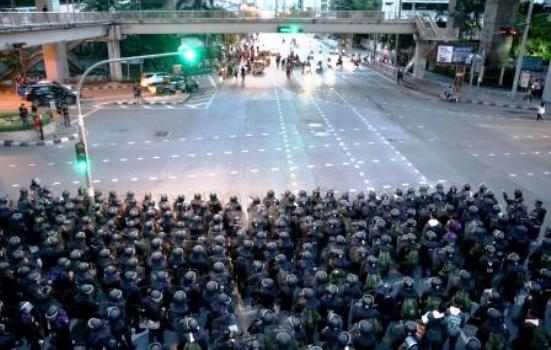By Shelal-
Thailand ‘s government proclaimed a stringent new state of emergency for the capital on Thursday, the day after a student demonstration against the country’s conventional regime saw an unusual moment in which the students were harassing the royal motorcade.
After the pre-dawn announcement, riot police stepped in to flush out protesters who had assembled outside the office of Prime Minister Prayuth Chan-ocha after a day of demonstrations and confrontation to put forward their demands, including the resignation of the former general, constitutional reforms and the reform of the monarchy.
Several top leaders of the protest movement were taken into detention, one of whom later announced on his Facebook page that he had been refused access to a lawyer and had been forced into a helicopter and taken to a city in the north of the country.
The police said they made 22 arrests. Despite a recent ban on major public demonstrations, several thousand people responded to calls for a rally to be held in another section of the city later on Thursday.
The text of the emergency declaration said it was needed because “certain groups of perpetrators intended to instigate an untoward incident and movement in the Bangkok area by way of various methods and via different channels, including causing obstruction to the royal motorcade.”
Wednesday’s demonstration in Bangkok’s historic city, not far from glittering temples and royal palaces, was the third big assembly of student-led activists who stretched the borders of what is deemed acceptable— and legal— language by openly challenging the position of Thailand ‘s monarchy in the nation’s power system.
The royal family of Thailand has long been considered sacrosanct and a pillar of Thai culture. King Maha Vajiralongkorn and other key members of the royal family are protected by a statute that is less majestic and has been frequently used to censor detractors who face up to 15 years in gaol if it is perceived to have offended the institution.
The protest — held on the anniversary of the student-led rebellion against the military regime in 1973—was complicated by the involvement of royalist anti-protests who had assembled both to demonstrate solidarity for the government and to welcome the royal family as they travelled to and from a religious ceremony in the city.
This led to a moment captured in photos and videos that circulated widely on social media, in which what seemed to be protesters waved and shouted just a few metres (feet) from the royal motorcade.
Such acts are uncommon in Thailand, where those waiting for royal motorcades often sit on the ground or prostrate themselves. Some experts say a line may have been crossed.
“What seemed to be a low-boil stalemate that the Prayuth government was managing with reasonable success has now, following the incident involving the procession of the queen’s motorcade down a street in which an active protest was under way and the arrests of protest leaders, become a full-blown crisis,” said Michael Montesano, coordinator of the Thailand Studies Program at the ISEAS-Yusof Isak Institute in Singapore. “Unlike even 48 hours ago, the country is in dangerous territory now.”
Government spokeswoman Anucha Buraphachaisri announced Thursday morning that the Prime Minister had directed the police to take stern action against those who disrupt the royal procession or otherwise insult the monarchy. One change is that the police said they would build checkpoints across Bangkok for security purposes.
Holding order will be encouraged by the latest Bangkok Emergency Order, which forbids illegal meetings of more than five people and grants the authorities extra powers they find necessary to deter unrest, including the immediate arrest of individuals without charge.
It also bans news that distorts facts or could cause a “misunderstanding.” Thailand is currently under national emergency law as part of its attempts to suppress coronavirus, and it was not entirely clear if the current declaration was different.
Protesters met again in the shopping district of Bangkok on Thursday afternoon and in the evening. The crowd became large enough to block a major intersection by high-rise malls and a prominent temple, where a number of speakers condemned the regime.
Police stood by while the crowd chanted rude slogans calling for the prime minister to step down. They also chanted “Free our friends,” in reference to the arrested leaders. “I want to fight for my future.
I want to fight for my friends. I want to fight for my democracy. My country must be democracy,” said 24-year-old NGO worker Aitarnik Chitwiset.
The protest campaign was initiated in March by university students, but soon failed as Thailand was hit by the coronavirus pandemic.
It came back in July, when the threat from the virus had eased, and has since increased in scale. The movement ‘s initial key demands were new elections, amendments to the constitution to make it more inclusive, and an end to the intimidation of activists.
The demonstrators allege that Prayuth, who led a coup in 2014 that overthrew an elected government, was returning to power arbitrarily in last year’s general election because the laws had been modified to favour a pro-military group.
Protesters argue that a constitution adopted under military rule and passed in a referendum in which protesting against it was illegal is undemocratic.
Nevertheless, analysts say the incident with the royal motorcade may harden positions.
It “is not just unprecedented but will be shocking for many,” said Kevin Hewison, professor emeritus from the University of North Carolina and veteran Thai studies scholar.
“Yet it is reflective of how a new generation of protesters sees the monarchy and military-backed regime as intertwined and that political reform demands reform of the monarchy as well.”

